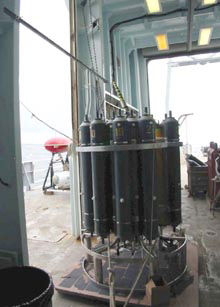
The CTD (in the foreground) in the staging bay, ready for deployment. The Autonomous Underwater Vehicle (AUV) ABE, is partially visible in the left background. Refer to the ROV/AUV and Plumes essays for more information on these instruments. Click image for larger view.
Final Preparations
June 29, 2002
Susan Merle, Geological Research Assistant
Vents Program, Pacific Marine Environmental Laboratory, NOAA
En route to Explorer Ridge
After several days in port loading the Thompson with tons (literally) of scientific equipment and ship supplies, 24 members of the scientific party and 20 Thompson crew members are steaming towards Explorer Ridge. At the present speed of 11 knots (about 12.5 mph), the expected arrival time on site is 2:30am Pacific Standard Time. Most scientists are spending the day taking care of last-minute details.
As usual, the first day is spent getting ready for the upcoming demanding program and getting used to the ship's motion. Mal de mer (sea sickness) is a common affliction the first couple of days at sea in these northern latitudes. When the ship arrives on site, we will first conduct a conductivity, temperature, and depth (CTD) cast, which will provide a sound-velocity profile for the EM300 bathymetric survey to follow. And perhaps, we may take a first look at the nature of the hydrothermal systems in this area. A magnetometer will be towed behind the ship at the same time as the bathymetric survey. In the coming days we will be searching for hydrothermal vent sites along Explorer Ridge. Stay tuned!
Sign up for the Ocean Explorer E-mail Update List.






















